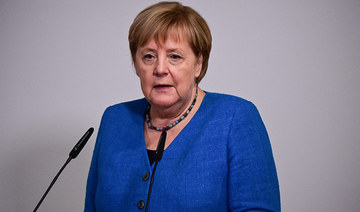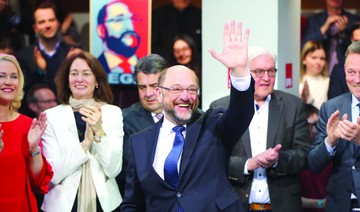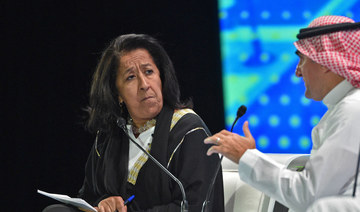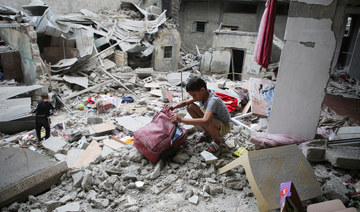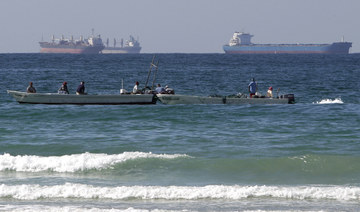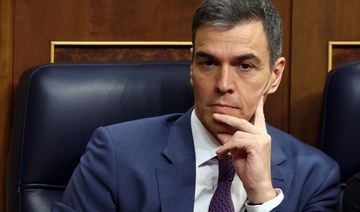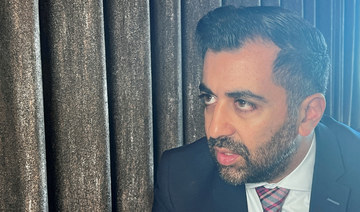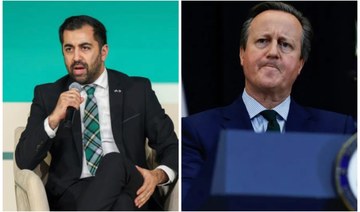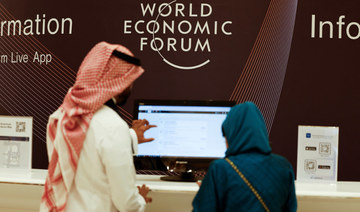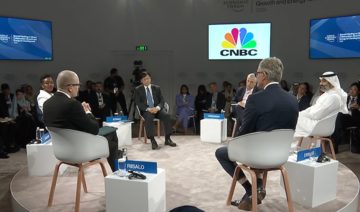BERLIN: The contenders to succeed Angela Merkel as Germany’s chancellor sought to mobilize voters Friday as the election campaign neared its close.
They touted their credentials to lead Europe’s biggest economy into a new era as it grapples with the fallout from the coronavirus pandemic and climate change.
Merkel is stepping down after 16 years in power, and the race is wide open ahead of Sunday’s parliamentary election. Polls show the outgoing leader’s center-right Union bloc, with Armin Laschet as its candidate for chancellor, a little behind or nearly level with the center-left Social Democrats, who have Finance Minister Olaf Scholz seeking the chancellorship.
The Greens, with Annalena Baerbock making the party’s first run for chancellor, are trailing in third place but could end up playing the kingmaker in forming a government.
Experts say one reason why this year’s German election is tighter and less predictable than usual is that the candidates are relative unknowns to most voters.
“It’s certainly not the most boring election,” University of Leipzig political scientist Hendrik Traeger said. “There were those in which Angela Merkel stood as the incumbent and it was simply a question of who she would govern with.”
This time, Merkel’s party has struggled to energize its traditional base, which has so far failed to warm to Laschet, the governor of North Rhine-Westphalia state.
“The key question is whether these voters will overcome the Laschet hurdle and vote for the Union despite Laschet” said Peter Matuschek of polling company Forsa. “Or will they abstain from the vote or even choose another party?”
Scholz, whose party has made steady gains in opinion polls during the campaign on the strength of his relative popularity, touted the outgoing government’s success in preserving jobs during the pandemic.
“What we have seen is that we are succeeding in avoiding the major economic and social crisis that otherwise would have hit us,” he said at a rally in Cologne. “We put a lot of money into bringing jobs and companies through this crisis, and today, we can say that we have succeeded. We see an upswing ahead of us.”
Scholz, who wants to raise Germany’s minimum wage and increase taxes for top earners, argued that anyone calling for tax relief for the rich now “can’t count, doesn’t understand anything about finance.”
The Union bloc, an alliance of Merkel’s Christian Democratic Union party and its Bavaria-only sister party, the Christian Social Union, contends that any tax increases would be counterproductive as the German economy recovers. Laschet said at a rally in Munich that it would be “exactly the wrong way” out of the pandemic.
“The pandemic is now in its final phase, and (the Social Democrats) are beginning again with their old socialist classics from the 80s — bureaucracy, tax increases, patronizing people,” he said.
Merkel declared that “for Germany to remain stable, Armin Laschet must become chancellor and (the Union) must be the strongest party.” She was making the second of three appearances in the final week of a campaign from which she has been largely absent.
Laschet praised Merkel’s record. “It’s up to us to carry this legacy forward,” he said. “If we get it wrong now, everything that was achieved in 16 years could be squandered.”
Baerbock, the Greens’ candidate, focused her pitch on fighting climate change, her party’s central issue.
“This election is a choice of direction,” she said in Duesseldorf. “This election is a climate election.”
“We can’t afford half-measures anymore,” said Baerbock, whose party wants to ramp up carbon prices and end the use of coal earlier than planned. “We need finally to have a climate government — with all its strength, with all its heart and with full passion.”
“Yes, it’s a risk to do something new, but where has government experience alone brought us, if that’s the standard for a parliamentary election?” asked Baerbock, the only candidate for chancellor who lacks government experience. “It has led us to a dead end.”
Tens of thousands of environmental activists staged a rally outside Germany’s parliament earlier Friday to demand that politicians take stronger action to curb climate change.
Migration has been less of a concern to many voters than in 2017. Foreign policy has not come up much during the campaign but became an issue during the final television debate Thursday, with the Greens calling for a tougher stance on China.
About 60.4 million Germans are eligible to vote for a new parliament on Sept. 26. The strongest party will be best-placed to form a governing coalition, though that isn’t automatic.
The business-friendly Free Democrats are angling for a place in government after pulling the plug on coalition talks after the 2017 election. The far-right Alternative for Germany is expected to do well in the country’s east, but other parties refuse to work with it.
The Left Party, which opposes NATO and German military deployments abroad, remains a possible governing partner for the Greens and Social Democrats, a prospect that has drawn alarm from conservatives. Friday’s center-right rally was larded with warnings that such an alliance would damage Germany’s economy and international standing.
Election officials say many more people will vote by mail this year due to the pandemic, but this isn’t expected to affect turnout significantly.
Contenders tout credentials in close vote to replace Merkel
https://arab.news/696uc
Contenders tout credentials in close vote to replace Merkel
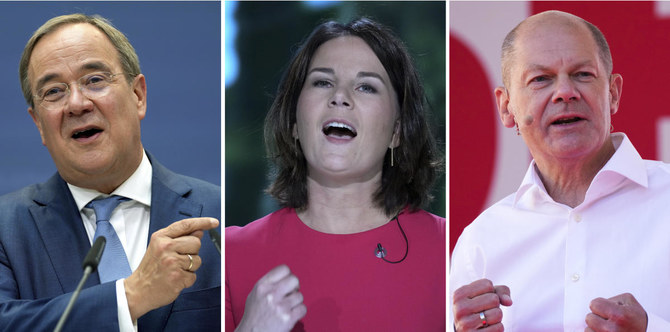
- Merkel is stepping down after 16 years in power, and the race is wide open ahead of Sunday's parliamentary election
- Polls show the outgoing leader's center-right Union bloc, with Armin Laschet as its candidate for chancellor
Malaysia targeting Gulf trade and tech ties at WEF, minister says
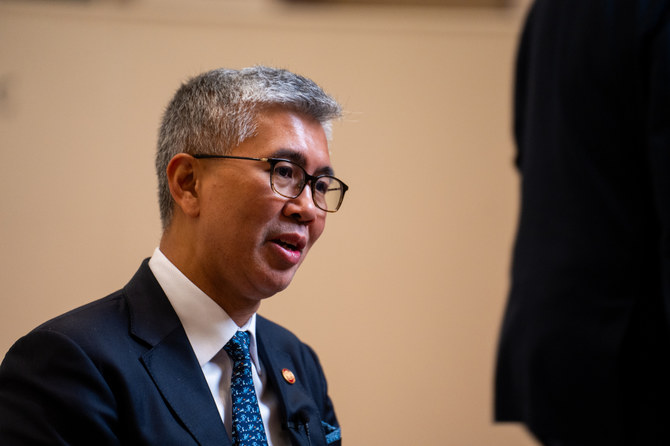
- Malaysia is also exploring investment and technology-sharing deals in artificial intelligence and the digital economy
RIYADH: Malaysia is looking to partner with Gulf-based companies on renewable energy, the country’s minister of investment has said.
Speaking to Arab News at the two-day World Economic Forum meeting in Riyadh, Tengku Zafrul Aziz said that about 50 Malaysian companies are in discussions to invest in renewable energy and share technologies.
“There is a lot of demand now for green renewable energy. We want partners who can not only go by funding, as we have funding capabilities, but also more in terms of technology and know-how,” he said.
“Many GCC companies who have already invested in this area are willing to share technology pools and invest with our funds, our companies, and our sovereign wealth fund.”
Malaysia is also exploring investment and technology-sharing deals in artificial intelligence and the digital economy.
“We also got interest from GCC companies on that matter and they have invested a lot in this technology. Now we want to learn and partner, so that the infrastructure that we build using digital platforms can be applied using applications that some of these companies already have.”
The World Economic Forum meeting in the Saudi capital is focusing on global collaboration, growth and energy for development — themes that the Malaysian minister said were “apt” given the geopolitical challenges in the region.
“This is a platform where we can share ideas about how we can improve the standards of living for all and not just focus on issues that may benefit a few,” he added.
“We want to see growth, especially in terms of trade and economy, and that must be beneficial to all. We want to see growth that is sustainable and equitable — growth that is inclusive. This is an opportunity to strengthen trade and investment linkages between the GCC and Southeast Asia.
“We need to strike the right balance when we talk about the quantity of the growth vs. the quality of that growth.”
Aziz said that parties are also exploring new multilateral trade agreements between the ASEAN union and the GCC, in an effort to launch a more comprehensive economic partnership agreement.
“This will deepen the relationship between countries in terms of economy, which will bring about peace. Malaysia is an open economy,” he said.
“While we continue to engage China as Malaysia’s largest trade partner, we are looking to engage other countries in constructive ways.”
Iran slams crackdown on US student protesters

- The demonstrations began at Columbia University in New York and have since spread across the country
Tehran: Iran on Monday criticized a police crackdown in the United States against university students protesting against the rising death toll from the Israel-Hamas war in the Gaza Strip.
“The American government has practically ignored its human rights obligations and respect for the principles of democracy that they profess,” foreign ministry spokesman Nasser Kanani said.
Tehran “does not at all accept the violent police and military behavior aimed at the academic atmosphere and student demands,” he said.
American universities have been rocked by pro-Palestinian demonstrations, triggering campus clashes with police and the arrest of some 275 people over the weekend.
The demonstrations began at Columbia University in New York and have since spread across the country.
In Iran, hundreds of people demonstrated in Tehran and other cities on Sunday in solidarity with the US demonstrations.
Some carried banners proclaiming “Death to Israel” and “Gazans are truly oppressed,” state media reported.
The Gaza war broke out after the October 7 attack by Palestinian militants on Israel which killed 1,170 people, mostly civilians, according to Israeli figures.
Tehran backs Hamas, but has denied any direct involvement in the attack.
Israel’s retaliatory offensive against Hamas has since killed at least 34,488 people in Gaza, mostly women and children, according to the Hamas-run territory’s health ministry.
“What we have seen in American universities in recent days is an awakening of the world community and world public opinion toward the Palestinian issue,” Kanani said.
“It is not possible to silence the loud voices of protesters against this crime and genocide through police action and violent policies.”
Pedro Sanchez stays on as Spain’s prime minister after weighing exit
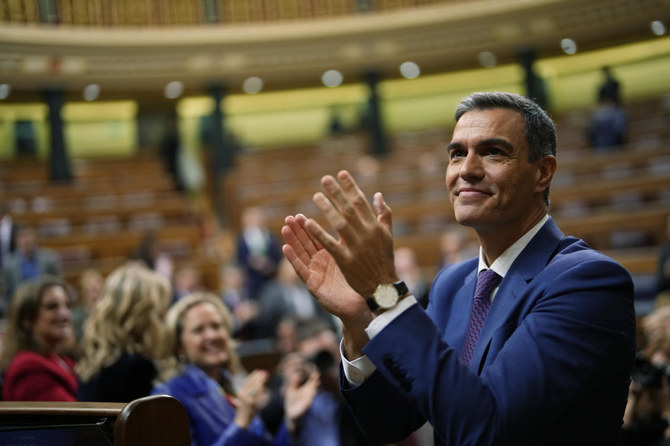
- Sanchez had surprised foes and allies when earlier said he considers quitting
- He described the court investigation of his wife Begona Gomez for influence peddling and business corruption as orchestrated by his opponents
MADRID: Spain’s Prime Minister Pedro Sanchez said on Monday he had decided to continue in office, days after abruptly announcing he was considering his future following the launch of a corruption investigation against his wife.
The center-left prime minister, 52, had surprised foes and allies alike when he said on Wednesday he was taking time from public duty to consider quitting. He described the court investigation of his wife Begona Gomez for influence peddling and business corruption as orchestrated by his opponents.
Sanchez met King Felipe VI on Monday — a step that would have been necessary should he have decided to resign — but announced in a televised address that he had informed the monarch of his decision to stay on. He had been encouraged to stay by widespread expressions of support over the weekend, Sanchez said.
“I have decided to go on, if possible even stronger as prime minister. This is not business as usual, things are going to be different,” he said in a national broadcast.
His announcement that he might quit had caused further turmoil in Spanish politics, where a fractious parliament has struggled to form coalition governments after close elections. Should a new election have been required, it would have been the fourth in five years.
The opposition will try to exploit the sign of indecision from Sanchez, but the impact may be limited because Spain’s political landscape is already so polarized, said Ignacio Jurado, political science professor at Madrid’s Carlos III University.
“His credibility is already hotly contested and voters have already given it to him or taken it away,” he said. “As a leader he has shown a weakness and it’s something that the opposition will exploit a lot.”
Scottish First Minister Humza Yousaf resigns
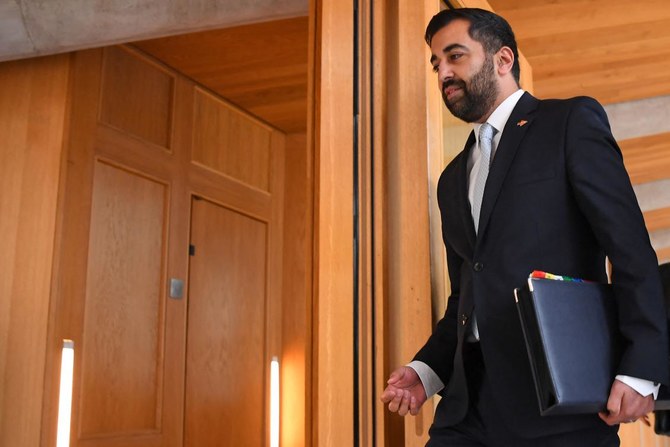
- Humza Yousaf said he would continue as first minister until a successor has been elected.
LONDON: Scotland’s First Minister Humza Yousaf resigned as leader of the Scottish National Party (SNP) on Monday and said he had ordered a contest be held to select a replacement.
“I’ve concluded that repairing our relationship across the political divide can only be done with someone else at the helm,” Yousaf said at a press conference in Edinburgh.
“I have therefore informed the SNP’s national secretary of my intention to stand down as party leader and ask that she commences a leadership contest for my replacement as soon as possible.”
He said he would continue as first minister until a successor has been elected.
Last week, Yousaf abruptly ended a power-sharing agreement between his Scottish National Party (SNP) and the Green Party, in the hopes that he could lead a minority government — but opposition parties have tabled a vote of no confidence.
The pro-independence SNP’s fortunes have faltered amid a funding scandal and the resignation of a party leader last year, while there has been infighting over how progressive its pitch should be as it seeks to woo back voters.
Just days ago, Yousaf said he was “quite confident” that he could win the no confidence vote called by political opponents, but by Monday, his offer of talks with other parties to try to shore up his minority government seemed to be faltering.
The leadership crisis and a second no-confidence vote against the Scottish government deepens problems faced by Yousaf’s Scottish National Party, which is losing popular support after 17 years of heading the Scottish Government.
Earlier this month, polling firm YouGov said the Labour Party had overtaken the SNP in voting intentions for a Westminster election, for the first time in a decade.
The leader of the Scottish Greens, Patrick Harvie, told BBC radio there was nothing Yousaf could say to persuade his party to support the first minister in the parliamentary confidence vote, leaving Yousaf with few options.
The vote is due to take place later this week.
A victory for Labour in Scotland in Britain’s next national election — expected later this year — would significantly bolster the party’s chances of taking power from Prime Minister Rishi Sunak’s Conservative Party.
If Yousaf loses, parliament would have 28 days to choose a new first minister before an election is forced.
Former SNP leader John Swinney has been approached by senior party figures to become an interim first minister in the event of Yousaf being forced from office, the Times newspaper said, adding that Swinney was reluctant to step up because of personal circumstances.
Yousaf, who previously held health and justice ministerial briefs in the Scottish Government, succeeded former SNP leader Nicola Sturgeon as first minister in March 2023.
She resigned last year and has since been embroiled in a party funding scandal with her husband, who was charged this month with embezzling funds. Both deny wrongdoing.
Global teacher shortage needs more than AI: WEF panelists
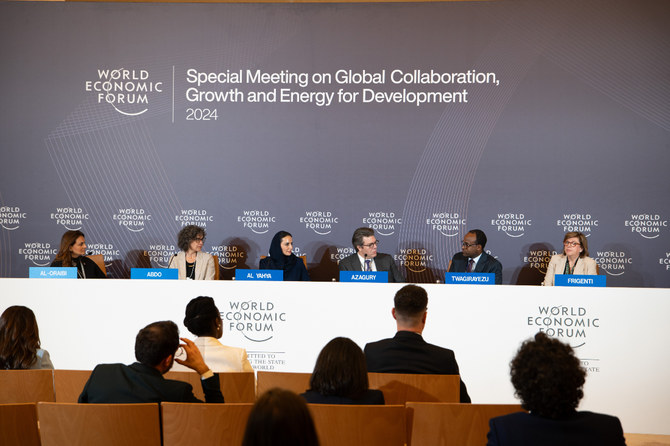
- Tailored solutions required for less-developed nations, says expert
- AI must complement education and training, changing of curricula
RIYADH: The global shortage of teachers will not be remedied solely through the use of artificial intelligence, according to education experts and decision-makers at the World Economic Forum’s Special Meeting in Riyadh.
“Teachers is the biggest problem at the moment for the education sector in low- and middle-income countries,” Laura Frigenti, chief of the Global Partnership for Education platform, told the panel on Sunday.
Gaspard Twagirayezu, Rwanda’s education minister, said that AI can revolutionize education and provide solutions for the global shortage of teachers.
“Of course, AI and technology are not going to replace teachers,” he added. “We can make sure that teachers are properly educated.”
“Here, we are trying to talk about how AI can help in producing education materials for the teachers so that we do not have all these expensive training sessions that we all have to go through.”
Stressing that AI can support teachers in the classroom, Twagirayezu explained that “teachers can be enabled to learn on their own using AI.”
Frigenti said that when it comes to harnessing the power of artificial intelligence in education, “there is not a kind of a one-size-fits-all technology that you can just import into one particular country.”
“You have to start from the conditions of that country and think in terms of a solution,” she continued. If there are no tailored solutions, this would “create a much bigger gap between a part of the world that can invest $8,000 per child per year in education and a part of the world that barely manages to invest $80.”
She added: “And that is going to create all sorts of socio-economic disparities, inequalities within society, (and) inequalities between the Global North and Global South.”
Frigenti added: “We integrate the improvements that technology and AI can add to the way in which the sector performs or is managed to a bigger way of thinking about the sector’s needs to transform, which includes a lot — changing the curricula (and) thinking about what you have to do for the (teachers) problem.”
The panel discussion, titled “Is Education Ready for AI,” featured speakers including Rudayna Abdo, founder and CEO of Thaki; Jack Azagury, group CEO of Accenture; and Deemah Al-Yahya, secretary-general of the Digital Cooperation Organization.



